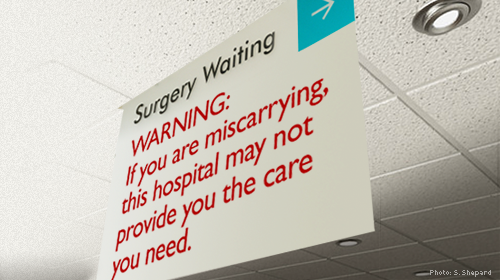
"Whatever you do, if anything happens, don't take me to St. Vincent's." Those were the words my friend uttered to her husband regularly throughout her pregnancy years ago, when St. Vincent's, a Catholic hospital serving lower Manhattan, was still open. Even though St. Vincent's was the hospital closest to her home, she knew the risks of going to a Catholic hospital with a pregnancy complication. She knew that her care could be compromised – that Catholic hospitals adhere to religious directives issued by the U. S. Conference of Catholic Bishops governing Catholic health services.
Tamesha Means didn't know this. When her water broke at eighteen weeks of pregnancy, she went to her local hospital. It was historically secular, but had recently been gobbled up by a large Catholic health care system. What happened to her? She got sent home – more than once – with the hospital telling her there was nothing it could do. They didn't tell her that, given her stage of pregnancy, there was almost no chance the fetus would survive, that attempting to continue the pregnancy would put her health and possibly even life at risk, or that, given these factors, the safest course of care would be to end the pregnancy. They didn't tell her any of that even in the face of her bleeding, pain, and signs of infection.
Tamesha didn't get the information or care she deserved because her local hospital is bound by the Ethical and Religious Directives for Catholic Health Care (the Directives), issued by the U.S. Conference of Catholic Bishops. She got care governed by religious directives – and she became infected. And the Bishops got a lawsuit.
Tamesha's story could be yours. That's the point of a new report, Miscarriage of Medicine: The Growth of Catholic Hospitals and the Threat to Reproductive Health Care, released yesterday by MergerWatch and the ACLU. The report shows the continued expansion of Catholic hospitals and systems. It reports on facts that most of us don't know, but should:
- By 2011, 10 percent of all acute-care hospitals were Catholic-sponsored or –affiliated. Between 2001 and 2011, the number of Catholic-sponsored or –affiliated acute-care hospitals increased by 16 percent, while all other types of non-profit hospitals declined in numbers.
- In 2011, 10 of the 25 largest health systems in the nation were Catholic-sponsored.
In other words, if you face a medical complication, you have a one in ten chance of landing in a Catholic hospital. This matters.
If you are anything like me, you think when you go to the hospital, medical standards, not religious rules, govern the care you receive. But the Directives prohibit a range of reproductive health services, including contraception, sterilization, many infertility treatments, and abortion care, even when a woman's health or life is in danger. Moreover, they often restrict even the ability of hospital staff to provide patients with full information and referrals for care that conflict with religious teachings. As Tamesha's story shows, they can interfere even with the care you get if you are miscarrying. You want to know that before you walk in the door – or are rolled into the ER – with a complication in your pregnancy.
Don't get us wrong. The U.S. Conference of Catholic Bishops is entitled to its religious beliefs. They are free to oppose abortion, to discourage and even demonize it. That's their right and the ACLU will rush to defend it. But when it comes to what goes on in a hospital, we've gone well beyond belief. We are talking about medical care. We can be talking about life and death.
We could be talking about you.
Learn more about discriminatory religious practices and other civil liberty issues: Sign up for breaking news alerts, follow us on Twitter, and like us on Facebook.
Stay informed
Sign up to be the first to hear about how to take action.
By completing this form, I agree to receive occasional emails per the terms of the ACLU's privacy statement.
By completing this form, I agree to receive occasional emails per the terms of the ACLU's privacy statement.
